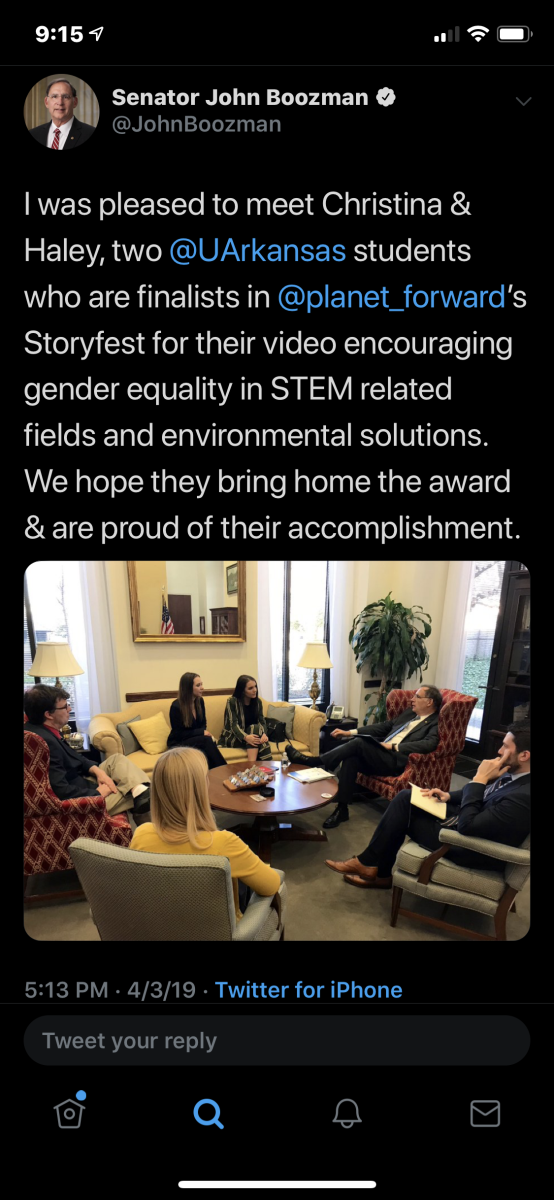
FAYETTEVILLE, Ark. – A video plea for more women to lead efforts to curb climate change won national recognition for two University of Arkansas students: Haley Knighten, a chemical engineering junior from Hot Springs, and Christina Trexler, an honors computer science and math freshman and Bodenhamer Fellow from Springdale.
Their video, “Environmental STEMinism,” won the “Fan Favorite” award in the Storyfest 2019 competition hosted by Planet Forward, an outreach project of the Center for Innovative Media at the George Washington University School of Media and Public Affairs.
The Planet Forward Storyfest Awards recognizes the best student-told stories illuminating environmental issues and solutions. Prizes are offered for best article, video, short video, podcast, multimedia essay, and fan favorite, which recognizes the entry that sparks the most engagement online across all social media platforms. More than 200 entries were submitted from across the U.S.
Knighten and Trexler have just returned from the 2019 Planet Forward Summit in Washington, D.C., where they learned about environmental storytelling from experts in the field. The students also enjoyed a private night tour of the capitol with Congressman Bruce Westerman and met to discuss the video and legislative initiatives with Senator John Boozman. Boozman’s tweet about the meeting, closing with “We hope they bring home the award & are proud of their accomplishment,” gave the U of A students a major boost in the “Fan Favorite” competition.
Storytelling with Statistics
Haley Knighten chaired the College of Engineering’s “Women in STEM” week earlier this year. She decided to explore the topic further when chemical engineering professor Jamie Hestekin suggested she and Trexler submit a project to Planet Forward’s Storyfest competition. They began in December and conducted research for two months, unearthing startling evidence that climate change disproportionately impacts women.
For example, they found that women make up 80 percent of global refugees and populations displaced by climate change and that women and children spend an estimated 200 million hours every single day searching for water. The students also confirmed that women are woefully underrepresented in government and workforce roles where leaders are taking action to address climate change.
“We just dug in, and found statistics that are really hard to believe,” Trexler said. “Those are the types of figures that really impact people, but it was hard to find a way to summarize it all in 90 seconds.”
The actual filming proved to be the easy part, and Knighten and Trexler benefited from an unexpected assist from Jamie Hestekin’s daughter Zoe, age nine.
“She was really interested in the whole subject, and wanted to come and be our producer,” Knighten said.
“She said some of our lines, and we thought, ‘Ohmigosh, she’s got so much energy – she’s fierce!’ So we decided to include her in the video,” Trexler added.
Their dramatically lit, multigenerational call to seat more women around the boardroom tables where environmental action starts won more than double the number of votes as the next entry in the Planet Forward contest – which comes with a jaw-dropping prize.
Next Up: the Galápagos Islands
Planet Forward offers some pretty compelling incentives for college students willing to venture into environmental storytelling. This year’s prize winners will embark on a 10-day storytelling voyage through the Galápagos Islands with Lindblad Expeditions, National Geographic and Planet Forward. Together with five other award winners, Knighten and Trexler will depart Aug. 16 and already are planning how to document the experience.
“Even in Galápagos, they’re starting to see plastic show up,” Trexler said. “We’re going to be working on a story about the unique habitats there.”
“They have a library on the ship, and we’ll definitely spend time in there,” Knighten said.
Planet Forward only funds a single prizewinner in each category. To ensure that both Knighten and Trexler could go, the Honors College, the Ralph E. Martin Department of Chemical Engineering and Hestekin’s research group are funding half of the travel expenses for the two students.
Knighten and Trexler are beyond excited about that dream trip to the Galápagos Islands, but they already are planning their next steps in raising awareness that environmental issues are women’s issues.
“We want to keep the movement going – it’s not just for the contest. That’s why we created the Environmental STEMinism website,” Trexler said. They’re still considering their options for future campaigns, but social media will certainly be in the mix.
About the Honors College: The University of Arkansas Honors College was established in 2002 and unites the university’s top undergraduate students and professors in a learning environment characterized by discovery, creativity and service. Each year the Honors College awards up to 90 freshman fellowships that provide $72,000 over four years, and more than $1 million in undergraduate research and study abroad grants. The Honors College is nationally recognized for the high caliber of students it admits and graduates. Honors students enjoy small, in-depth classes, and programs are offered in all disciplines, tailored to students’ academic interests, with interdisciplinary collaborations encouraged. Fifty percent of Honors College graduates have studied abroad – three times the national average – and one hundred percent of them have engaged in mentored research.
About the University of Arkansas: The University of Arkansas provides an internationally competitive education for undergraduate and graduate students in more than 200 academic programs. The university contributes new knowledge, economic development, basic and applied research, and creative activity while also providing service to academic and professional disciplines. The Carnegie Foundation classifies the University of Arkansas among fewer than 2.7 percent of universities in America that have the highest level of research activity. U.S. News & World Report ranks the University of Arkansas among its top American public research universities. Founded in 1871, the University of Arkansas comprises 10 colleges and schools and maintains a low student-to-faculty ratio that promotes personal attention and close mentoring.
Topics
Contacts
Kendall Curlee, director of communications
Honors College
479-575-2024,
